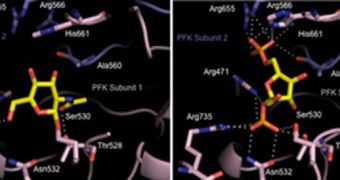California Institute of Technology (Caltech) investigators say that various types of cancerous cells use the sugar molecule GlcNAc to fuel their rapid growth. The chemical basically acts as a food source, so targeting it could literally starve off tumors.
Previous studies have shown that cancer requires massive amounts of amino acids and nucleotides, among other supplies, in order to develop at their characteristically-fast pace. They must also face the harsh conditions present inside the human body.
What the team found was that GlcNAc contributes to making this job easier for cancer cells. Future cancer therapies could, for example, focus on destroying the sugary supplies that tumors need to grow. Researchers published details of their new investigation in this week's issue of the top journal Science.
According to Caltech Professor of chemistry Linda Hsieh-Wilson, the leader of the research group, blocking the addition of this sugar molecule to cancer cells blocked tumor growth in mice.
When cancer begins developing in the body, it immediately begins to act on a molecular process called glycosylation, which controls the addition of carbohydrates such as GlcNAc to specific proteins.
“We have identified a novel molecular mechanism that cancer cells have co-opted in order to produce intermediates that allow them to grow more rapidly and to help them combat oxidative stress,” adds the lead researcer, who holds an appointment as an investigator at the Howard Hughes Medical Institute.
GlcNAc also plays an important role in the brain. If it binds to a protein called CREB, for example, it can prevent the latter from activating genes that facilitate the storage of long-term memories.
On the other hand, significantly reduced levels of the sugar in the frontal lobe of the brain can easily lead to neurodegeneration, a process that can be observed in forms of dementia such as Alzheimer's.
Scientists comment that it would be interesting to see whether the sugar, and the molecular processes it's involved in, affects the development of dementia-type conditions to any significant extent.
“The current thinking is that there's a balance between too little and too much glycosylation. Being at either extreme make things go awry, whether it's in the brain or in the case of cancer cells,” Hsieh-Wilson goes on to say.
The new study was made possible by grants from the US National Institutes of Health (NIH), the Department of Defense (DOD) Breast Cancer Research Program, and a Tobacco-Related Disease Research Program postdoctoral fellowship.

 14 DAY TRIAL //
14 DAY TRIAL //